仁爱版初中英语八年级上册导学案【全册】
仁爱版八年级英语上册导学案(全册)
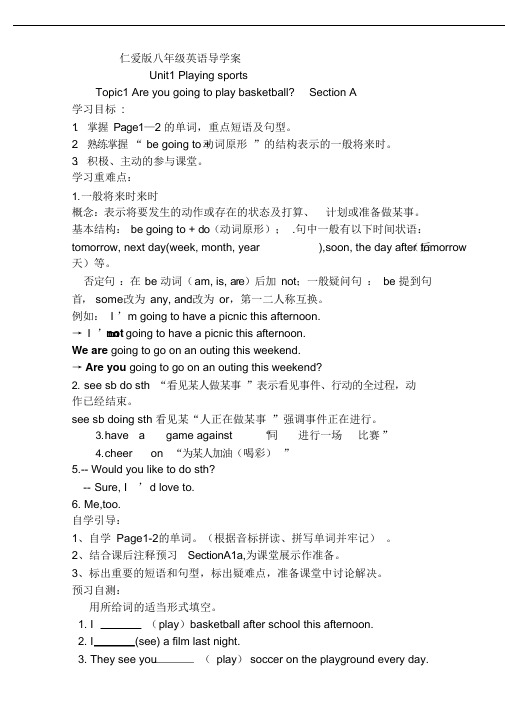
仁爱版八年级英语导学案Unit1 Playing sportsTopic1 Are you going to play basketball? Section A学习目标:1.掌握Page1—2 的单词,重点短语及句型。
2.熟练掌握“be going to 动+词原形”的结构表示的一般将来时。
3.积极、主动的参与课堂。
学习重难点:1. 一般将来时来时概念:表示将要发生的动作或存在的状态及打算、计划或准备做某事。
基本结构:be going to + do(动词原形);.句中一般有以下时间状语:后t omorrow tomorrow, next day(week, month, year ),soon, the day afte(r天)等。
否定句:在be 动词(a m, is, are)后加not;一般疑问句:be 提到句首,some改为any, and改为or,第一二人称互换。
例如:I ’m going to have a picnic this afternoon.→I ’n m ot going to have a picnic this afternoon.We are going to go on an outing this weekend.→Are you going to go on an outing this weekend?2. see sb do sth “看见某人做某事”表示看见事件、行动的全过程,动作已经结束。
see sb doing sth 看见某“人正在做某事”强调事件正在进行。
3. have a game against “同进行一场比赛”4. cheer on “为某人加油(喝彩)”5.-- Would you like to do sth?-- Sure, I ’d love to.6. Me,too.自学引导:1、自学Page1-2的单词。
(根据音标拼读、拼写单词并牢记)。
仁爱版八年级英语(上册)导学案
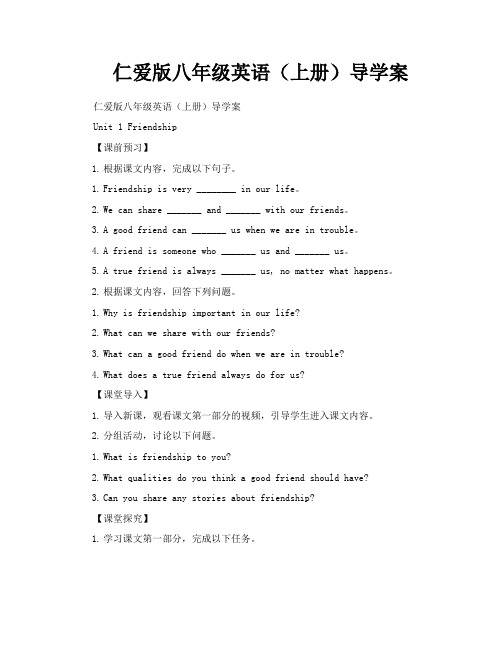
仁爱版八年级英语(上册)导学案仁爱版八年级英语(上册)导学案Unit 1 Friendship【课前预习】1.根据课文内容,完成以下句子。
1.Friendship is very ________ in our life。
2.We can share _______ and _______ with our friends。
3.A good friend can _______ us when we are in trouble。
4.A friend is someone who _______ us and _______ us。
5.A true friend is always _______ us, no matter what happens。
2.根据课文内容,回答下列问题。
1.Why is friendship important in our life?2.What can we share with our friends?3.What can a good friend do when we are in trouble?4.What does a true friend always do for us?【课堂导入】1.导入新课,观看课文第一部分的视频,引导学生进入课文内容。
2.分组活动,讨论以下问题。
1.What is friendship to you?2.What qualities do you think a good friend should have?3.Can you share any stories about friendship?【课堂探究】1.学习课文第一部分,完成以下任务。
1.阅读课文第一部分,并完成下面的练习。
a) 用自己的话总结出这部分的主要内容。
b) 在文中找出表示原因的句子,并写出原因。
c) 找出文中的两个意思相同的词组。
2.配对合作,完成课本练习。
仁爱版八年级英语上册导学案
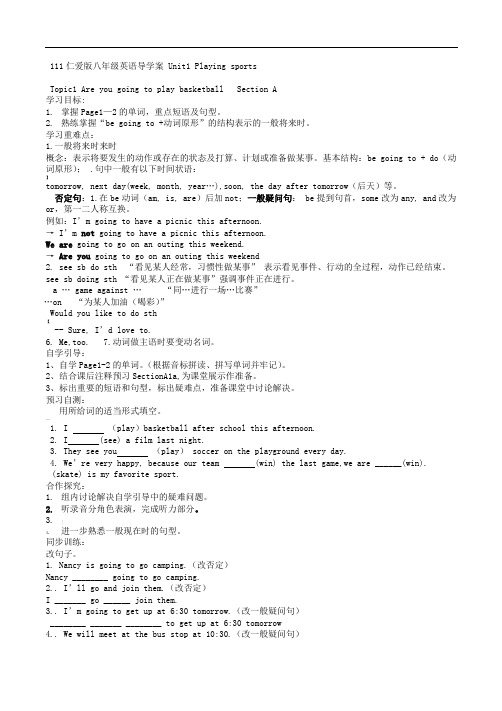
111仁爱版八年级英语导学案 Unit1 Playing sportsTopic1 Are you going to play basketball Section A学习目标:1.掌握Page1—2的单词,重点短语及句型。
2.熟练掌握“be going to +动词原形”的结构表示的一般将来时。
学习重难点:1.一般将来时来时概念:表示将要发生的动作或存在的状态及打算、计划或准备做某事。
基本结构:be going to + do(动词原形); .句中一般有以下时间状语:】tomorrow, next day(week, month, year…),soon, the day after tomorrow(后天)等。
否定句:1.在be动词(am, is, are)后加not;一般疑问句: be提到句首,some改为any, and改为or,第一二人称互换。
例如:I’m going to have a picnic this afternoon.→ I’m not going to have a picnic this afternoon.We are going to go on an outing this weekend.→ Are you going to go on an outing this weekend2. see sb do sth “看见某人经常,习惯性做某事”表示看见事件、行动的全过程,动作已经结束。
see sb doing sth “看见某人正在做某事”强调事件正在进行。
a … game against …“同…进行一场…比赛”…on “为某人加油(喝彩)”Would you like to do sth【-- Sure, I’d love to.6. Me,too.7.动词做主语时要变动名词。
自学引导:1、自学Page1-2的单词。
(根据音标拼读、拼写单词并牢记)。
2、结合课后注释预习SectionA1a,为课堂展示作准备。
仁爱英语八年级上Unit1Topic3导学案(仁爱版英语八年级)

仁爱英语八年级上Unit 1 Topic 3导学案 (仁爱版英语八年级)Unit 1 Topic 3写出下面动词的过去式1.hit---2.encourage ---3.improve ---4.ring---5.stand---6.take---7.buy---8.join---9.meet---10.hold---11.feel---12.win---Section A一. 写出下面动词的过去式1.hit---2.encourage ---3.improve ---4.ring---5.stand---6.take---7.buy---8.join---9.meet---10.hold---11.feel---12.win---二. 在文中划出下列短语并翻译1.talk about_________________2.take part in________________3.the boys’ 800-meter race________________________4.be good at ________________5.the long jump______________6.the high jump______________7.I hope so. _________________8.cheer ---on________________9.take part in________________10.It’s my first time to do sth_______________________11.be ready for sth___________12.do one’s best_____________13.enjoy doing sth____________14.the boys’ relay race ________15.a pair of running shoes______16.join in _________________17.have fun ________________三. 在文中找到下列句子并翻译总结1.I will take part in the school sports meet. 译:________________________________will + V原表达什么概念:________________________________More examples:⑴ I’ll be in the long jump and the high jump. ⑵ Steve will come to cheer me on.⑶ I believe you will win. ⑷ I’m sure the sports meeting will be exciting.Please find out more sentences with will + V原 in Section A①______________________________②______________________________③______________________________④______________________________⑤______________________________⑥______________________________找完后,你有没有发现won’t + V原的?Why? 请写出你的答案:______________________以上这么多的例句,到底要表达什么时候发生的动作或状态呢?请回答:______________________试试看!你会翻译下列句子吗?①我会在校门口等你。
仁爱版八年级英语上册导学案
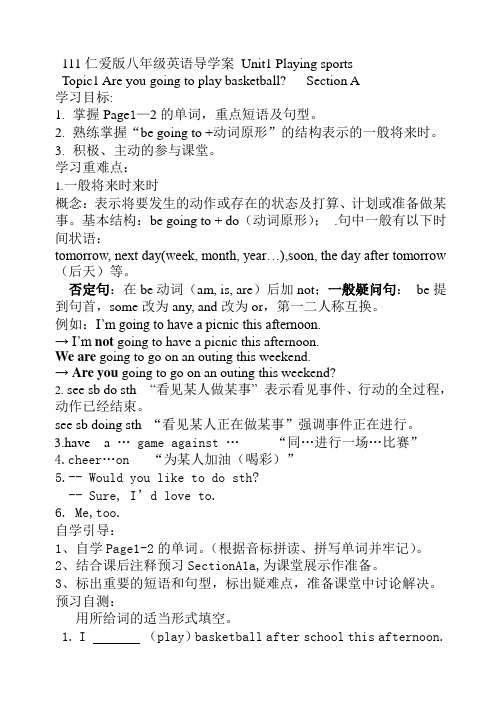
111仁爱版八年级英语导学案Unit1 Playing sportsTopic1 Are you going to play basketball? Section A学习目标:1.掌握Page1—2的单词,重点短语及句型。
2.熟练掌握“be going to +动词原形”的结构表示的一般将来时。
3.积极、主动的参与课堂。
学习重难点:1.一般将来时来时概念:表示将要发生的动作或存在的状态及打算、计划或准备做某事。
基本结构:be going to + do(动词原形);.句中一般有以下时间状语:tomorrow, next day(week, month, year…),soon, the day after tomorrow (后天)等。
否定句:在be动词(am, is, are)后加not;一般疑问句:be提到句首,some改为any, and改为or,第一二人称互换。
例如:I’m going to have a picnic this afternoon.→ I’m not going to have a picnic this afternoon.We are going to go on an outing this weekend.→ Are you going to go on an outing this weekend?2. see sb do sth “看见某人做某事”表示看见事件、行动的全过程,动作已经结束。
see sb doing sth “看见某人正在做某事”强调事件正在进行。
3.have a… game against …“同…进行一场…比赛”4.cheer…on “为某人加油(喝彩)”5.-- Would you like to do sth?-- Sure, I’d love to.6. Me,too.自学引导:1、自学Page1-2的单词。
(根据音标拼读、拼写单词并牢记)。
仁爱版八年级英语上册导学案(完整修改版)

仁爱版八年级英语上册导学案(完整修改版)Unit 1 Playing SportsTopic 1: Are You Going to Play Basketball?n AXXX:1.Master the words。
key phrases。
and sentence structures on Pages 1-2.2.Proficiently grasp the structure of "be going to + verb" to express the simple future tense.Key Points:1.Simple XXXConcept: XXX future。
ns。
plans。
or ns。
Basic structure: be going to + do (verb)。
XXX。
next day (week。
month。
year。
)。
soon。
the day after tomorrow。
etc.Negative form: add "not" after the auxiliary verb "be" (am。
is。
are).General n: move the auxiliary verb "be" to the beginning ofthe sentence。
change "some" to "any," "and" to "or," and swap the first and second person.For example: I'm going to have a XXX.I'm not going to have a XXX.We are going to go on an outing this weekend.Are you going to go on an outing this weekend?2."see sb do sth" means "XXX" and refers to the entire process of the event or n that has already ended.XXX" emphasizes that the event is XXX.3."have a。
最新仁爱版八年级英语上册导学案资料
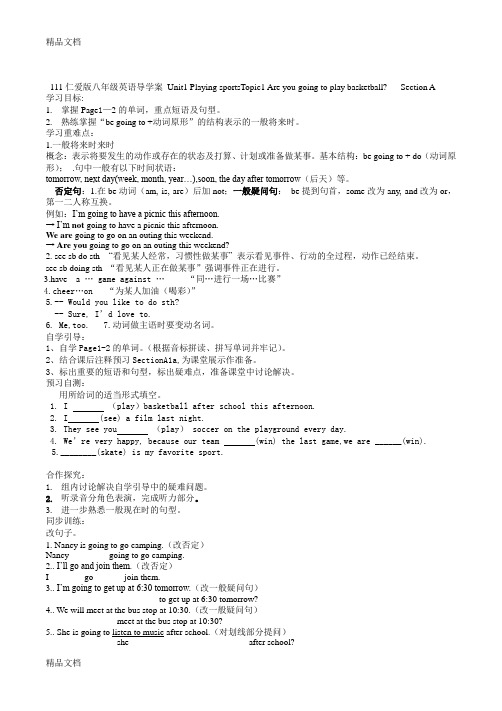
111仁爱版八年级英语导学案Unit1 Playing sportsTopic1 Are you going to play basketball? Section A 学习目标:1.掌握Page1—2的单词,重点短语及句型。
2.熟练掌握“be going to +动词原形”的结构表示的一般将来时。
学习重难点:1.一般将来时来时概念:表示将要发生的动作或存在的状态及打算、计划或准备做某事。
基本结构:be going to + do(动词原形); .句中一般有以下时间状语:tomorrow, next day(week, month, year…),soon, the day after tomorrow(后天)等。
否定句:1.在be动词(am, is, are)后加not;一般疑问句:be提到句首,some改为any, and改为or,第一二人称互换。
例如:I’m going to have a picnic this afternoon.→ I’m not going to have a picnic this afternoon.We are going to go on an outing this weekend.→ Are you going to go on an outing this weekend?2. see sb do sth “看见某人经常,习惯性做某事”表示看见事件、行动的全过程,动作已经结束。
see sb doing sth “看见某人正在做某事”强调事件正在进行。
3.have a… game against …“同…进行一场…比赛”4.cheer…on “为某人加油(喝彩)”5.-- Would you like to do sth?-- Sure, I’d love to.6. Me,too.7.动词做主语时要变动名词。
自学引导:1、自学Page1-2的单词。
(根据音标拼读、拼写单词并牢记)。
仁爱版八年级英语上册导学案
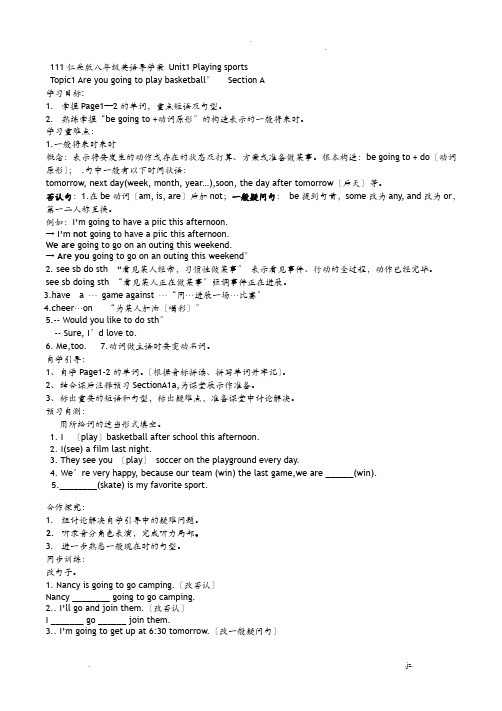
111仁爱版八年级英语导学案Unit1 Playing sportsT opic1 Are you going to play basketball〞Section A学习目标:1.掌握Page1—2的单词,重点短语及句型。
2.熟练掌握“be going to +动词原形〞的构造表示的一般将来时。
学习重难点:1.一般将来时来时概念:表示将要发生的动作或存在的状态及打算、方案或准备做某事。
根本构造:be going to + do〔动词原形〕; .句中一般有以下时间状语:tomorrow, ne xt day(week, month, year…),soon, the day after tomorrow〔后天〕等。
否认句:1.在be动词〔am, is, are〕后加not;一般疑问句:be提到句首,some改为any, and改为or,第一二人称互换。
例如:I’m going to have a piic this afternoon.→ I’m not going to have a piic this afternoon.We are going to go on an outing this weekend.→Are you going to go on an outing this weekend〞2. see sb do sth “看见某人经常,习惯性做某事〞表示看见事件、行动的全过程,动作已经完毕。
see sb doing sth “看见某人正在做某事〞强调事件正在进展。
3.have a …game against …“同…进展一场…比赛〞4.cheer…on “为某人加油〔喝彩〕〞5.-- Would you like to do sth〞-- Sure, I’d love to.6. Me,too.7.动词做主语时要变动名词。
自学引导:1、自学Page1-2的单词。
〔根据音标拼读、拼写单词并牢记〕。
仁爱版初中英语八年级上册导学案【全册】
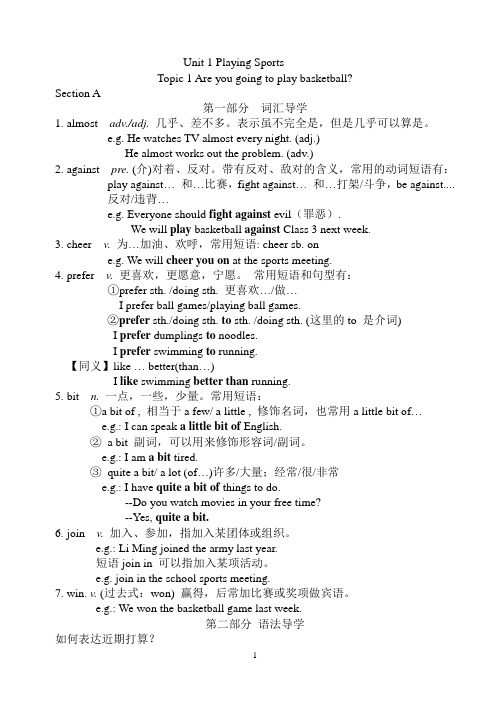
Unit 1 Playing SportsTopic 1 Are you going to play basketball?Section A第一部分词汇导学1. almost adv./adj. 几乎、差不多。
表示虽不完全是,但是几乎可以算是。
e.g. He watches TV almost every night. (adj.)He almost works out the problem. (adv.)2. against pre. (介)对着、反对。
带有反对、敌对的含义,常用的动词短语有:play against…和…比赛,fight against…和…打架/斗争,be against....反对/违背…e.g. Everyone should fight against evil(罪恶).We will play basketball against Class 3 next week.3. cheer v.为…加油、欢呼,常用短语: cheer sb. one.g. We will cheer you on at the sports meeting.4. prefer v. 更喜欢,更愿意,宁愿。
常用短语和句型有:①prefer sth. /doing sth. 更喜欢…/做…I prefer ball games/playing ball games.②prefer sth./doing sth. to sth. /doing sth. (这里的to 是介词)I prefer dumplings to noodles.I prefer swimming to running.【同义】like … better(than…)I like swimming better than running.5. bit n.一点,一些,少量。
常用短语:①a bit of , 相当于a few/ a little , 修饰名词,也常用a little bit of…e.g.: I can speak a little bit of English.②a bit 副词,可以用来修饰形容词/副词。
仁爱版英语八年级上册导学案
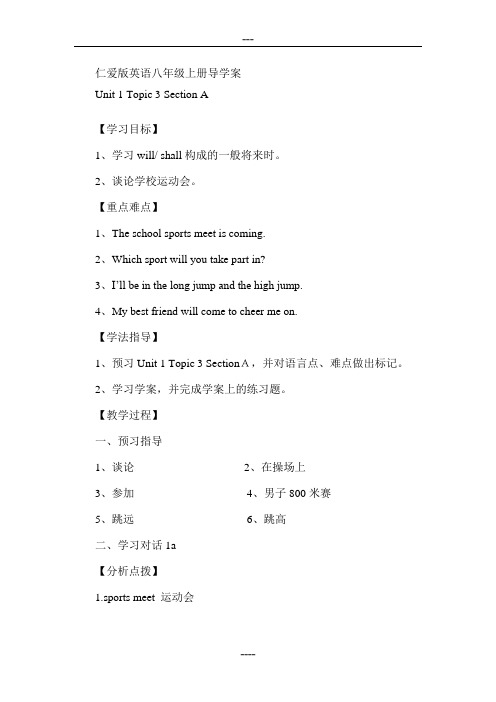
仁爱版英语八年级上册导学案Unit 1 Topic 3 Section A【学习目标】1、学习will/ shall构成的一般将来时。
2、谈论学校运动会。
【重点难点】1、The school sports meet is coming.2、Which sport will you take part in?3、I’ll be in the long jump and the high jump.4、My best friend will come to cheer me on.【学法指导】1、预习Unit 1 Topic 3 SectionA,并对语言点、难点做出标记。
2、学习学案,并完成学案上的练习题。
【教学过程】一、预习指导1、谈论__________________2、在操场上_____________3、参加_______________4、男子800米赛_______________5、跳远____________6、跳高______________二、学习对话1a【分析点拨】1.sports meet 运动会名词作定语修饰名词时,一般用单数形式,但man, woman, sport 作定语时通常用复数形式。
如:women teachers 女教师sports shoes 运动鞋The school sports meet 学校运动会就要开了。
现在进行时表示将来要发生的事,类似的动词还有go, leave, fly, start, meet等都可用现在进行时表示将来发生的动词。
2. take part in 参加be in + 活动参加......活动take part in 参加,后接活动名词,相当于join in。
区别:be in + 活动,表示“参加某活动”,相当于take part in例子:我将要参加足球赛。
I will take part in the football match.= I will ______ _______ the football match.= I will _________ _________ the football match.3. will表示一般将来时,由“will+动词原形”构成,当人称代词与will连用时,will可缩略为“’ll”。
2020年新仁爱版八年级英语上册 全一册导学案(精编)
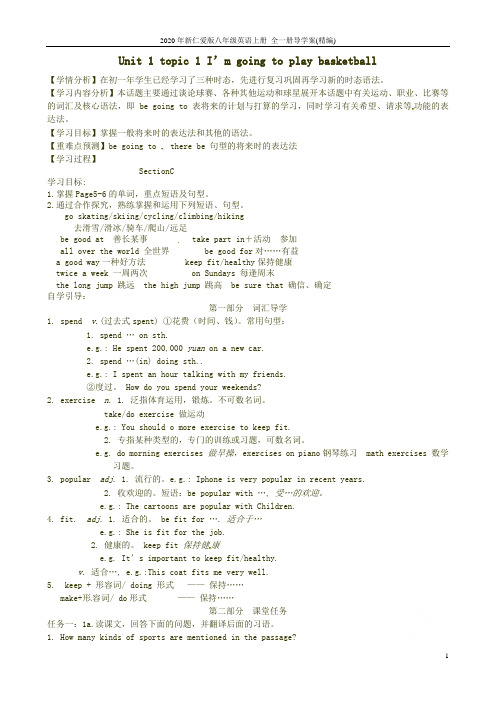
Unit 1 topic 1 I’m going to play basketball【学情分析】在初一年学生已经学习了三种时态,先进行复习巩固再学习新的时态语法。
【学习内容分析】本话题主要通过谈论球赛、各种其他运动和球星展开本话题中有关运动、职业、比赛等的词汇及核心语法,即be going to 表将来的计划与打算的学习,同时学习有关希望、请求等功能的表达法。
【学习目标】掌握一般将来时的表达法和其他的语法。
【重难点预测】be going to , there be 句型的将来时的表达法【学习过程】SectionC学习目标:1.掌握Page5-6的单词,重点短语及句型。
2.通过合作探究,熟练掌握和运用下列短语、句型。
go skating/skiing/cycling/climbing/hiking去滑雪/滑冰/骑车/爬山/远足be good at 善长某事 take part in+活动参加all over the world 全世界 be good for对……有益a good way一种好方法 keep fit/healthy保持健康twice a week 一周两次 on Sundays 每逢周末the long jump 跳远 the high jump 跳高 be sure that 确信、确定自学引导:第一部分词汇导学1. spend v.(过去式spent) ①花费(时间、钱)。
常用句型:1. spend … on sth.e.g.: He spent 200,000 yuan on a new car.2. spend …(in) doing sth..e.g.: I spent an hour talking with my friends.②度过。
How do you spend your weekends?2. exercise n. 1. 泛指体育运用,锻炼。
不可数名词。
2022年 《仁爱版八年级英语上册导学案完整修改版1》优秀教案0
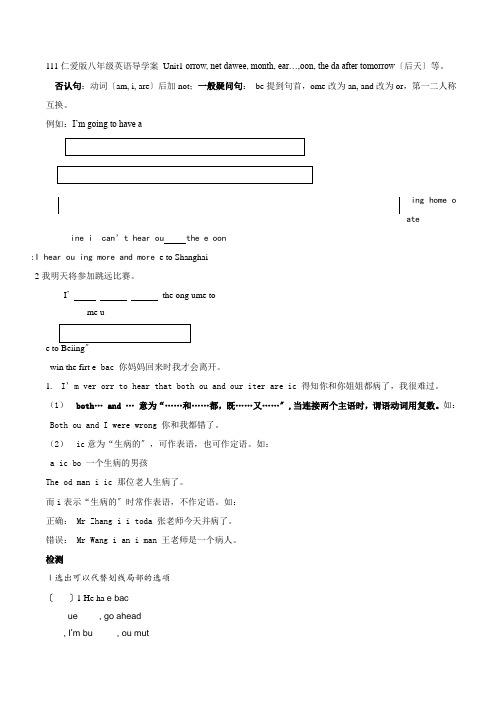
111仁爱版八年级英语导学案Unit1 orrow, net dawee, month, ear…,oon, the da after tomorrow〔后天〕等。
否认句:动词〔am, i, are〕后加not;一般疑问句:be提到句首,ome改为an, and改为or,第一二人称互换。
例如:I’m going to have aing home o Array ateine i can’t hear ou the e oon:I hear ou ing more and more e to Shanghai2我明天将参加跳远比赛。
I’the ong ume to _______me uwin the firt e bac 你妈妈回来时我才会离开。
1.I’m ver orr to hear that both ou and our iter are ic 得知你和你姐姐都病了,我很难过。
(1)both… and …意为“……和……都,既……又……〞,当连接两个主语时,谓语动词用复数。
如:Both ou and I were wrong 你和我都错了。
(2)ic意为“生病的〞,可作表语,也可作定语。
如:a ic bo 一个生病的男孩The od man i ic 那位老人生病了。
而i表示“生病的〞时常作表语,不作定语。
如:正确: Mr Zhang i i toda 张老师今天并病了。
错误: Mr Wang i an i man 王老师是一个病人。
检测Ⅰ选出可以代替划线局部的选项〔〕1 He ha e bacue , go ahead, I’m bu , ou mut5—Mut I tae e 我不知道他是否会来。
I don’t now whether he wi come or not 我不知道他是否要来。
1.What doe it oo ie 它长得像什么样子?oo ie “像〞如:What doe Tom oo ie当堂自测单项选择1 I don’t now _______ he wi come or not tomorrowA thatB whenC whatD whether2 Our Engih teacher i _______ and never _______ to u, o we ie her ver muchA funn; friendB funn; unfriendC fun; friendD fun; unfriend3 Wu Rui ie eee with b和某人一起来tae eon上课What a e on来吧!muica intrument 乐器3Water mae uing fewer and fewer in number4 Whae are the arget and heaviet anima in the word5 Now whae are in dange r becaue ome human i them and mae the ocean water dirtier6 Chinee tiger ive in the outh of china7 Chinee tiger are the odet t ing 〔越来越少〕in number最大最重的动物in the wordtiger ive in 的南部C The more eaierD More the eaier9 He i of the twoA taB taerC the taetD the taer10 He i taer than in hi caA other tudentB other tudentC an other tudentD the other tudent八年级英语导学案421 Unit4 Our WordTo e more beautifu in two ear 〔对画线局部提问〕_____ _____ wi Beiing become more beautifu4、We can’t finih the wor if he doen’t hee bac in a weeM unce eft Beiing after 3 month七、自我评价与反思你对今天的课一定很感兴趣吧,总结一下,你都学到了哪些知识?______________________422 Unit4 To e from France, I'm FrenchA: Rea Do ou ive in town or in the countrB: In ore friend than en to mae themThe worer ued ive mode, didn’t theIt i about iometer ong1.全力以赴,高效达标,在合作探究中培养团队协作精神。
最新仁爱版八年级英语上册导学案
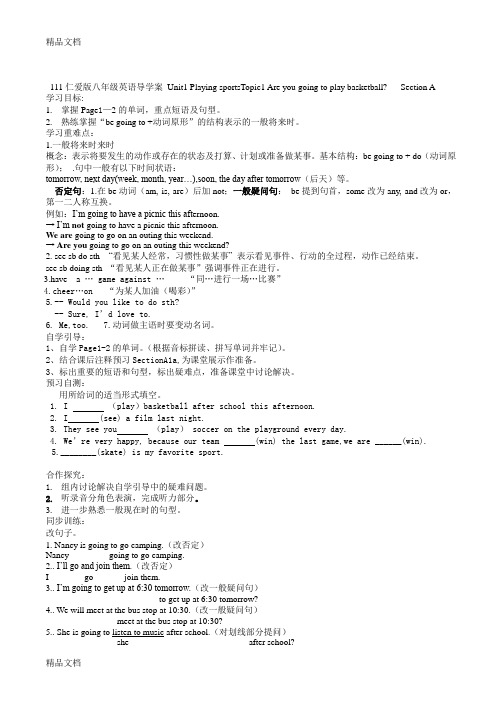
111仁爱版八年级英语导学案Unit1 Playing sportsTopic1 Are you going to play basketball? Section A 学习目标:1.掌握Page1—2的单词,重点短语及句型。
2.熟练掌握“be going to +动词原形”的结构表示的一般将来时。
学习重难点:1.一般将来时来时概念:表示将要发生的动作或存在的状态及打算、计划或准备做某事。
基本结构:be going to + do(动词原形); .句中一般有以下时间状语:tomorrow, next day(week, month, year…),soon, the day after tomorrow(后天)等。
否定句:1.在be动词(am, is, are)后加not;一般疑问句:be提到句首,some改为any, and改为or,第一二人称互换。
例如:I’m going to have a picnic this aft ernoon.→ I’m not going to have a picnic this afternoon.We are going to go on an outing this weekend.→ Are you going to go on an outing this weekend?2. see sb do sth “看见某人经常,习惯性做某事”表示看见事件、行动的全过程,动作已经结束。
see sb doing sth “看见某人正在做某事”强调事件正在进行。
3.have a… game against …“同…进行一场…比赛”4.cheer…on “为某人加油(喝彩)”5.-- Would you like to do sth?-- Sure, I’d love to.6. Me,too.7.动词做主语时要变动名词。
自学引导:1、自学Page1-2的单词。
(根据音标拼读、拼写单词并牢记)。
- 1、下载文档前请自行甄别文档内容的完整性,平台不提供额外的编辑、内容补充、找答案等附加服务。
- 2、"仅部分预览"的文档,不可在线预览部分如存在完整性等问题,可反馈申请退款(可完整预览的文档不适用该条件!)。
- 3、如文档侵犯您的权益,请联系客服反馈,我们会尽快为您处理(人工客服工作时间:9:00-18:30)。
Unit 1 Playing SportsTopic 1 Are you going to play basketball?Section A第一部分词汇导学闻丽1. almost adv./adj. 几乎、差不多。
表示虽不完全是,但是几乎可以算是。
e.g. He watches TV almost every night. (adj.)He almost works out the problem. (adv.)2. against pre. (介)对着、反对。
带有反对、敌对的含义,常用的动词短语有:play against… 和…比赛,fight against… 和…打架/斗争,be against.... 反对/违背…e.g. Everyone should fight against evil(罪恶).We will play basketball against Class 3 next week.3. cheer v. 为…加油、欢呼,常用短语: cheer sb. one.g. We will cheer you on at the sports meeting.4. prefer v. 更喜欢,更愿意,宁愿。
常用短语和句型有:①prefer sth. /doing sth. 更喜欢…/做…I prefer ball games/playing ball games.②prefer sth./doing sth. to sth. /doing sth. (这里的to 是介词)I prefer dumplings to noodles.I prefer swimming to running.【同义】like … better(than…)I like swimming better than running.5. bit n. 一点,一些,少量。
常用短语:①a bit of , 相当于a few/ a little , 修饰名词,也常用a little bit of…e.g.: I can speak a little bit of English.② a bit 副词,可以用来修饰形容词/副词。
e.g.: I am a bit tired.③ quite a bit/ a lot (of…)许多/大量;经常/很/非常e.g.: I have quite a bit of things to do.--Do you watch movies in your free time?--Yes, quite a bit.6. join v. 加入、参加,指加入某团体或组织。
e.g.: Li Ming joined the army last year.短语join in 可以指加入某项活动。
e.g. join in the school sports meeting.7. win. v. (过去式:won) 赢得,后常加比赛或奖项做宾语。
e.g.: We won the basketball game last week.第二部分语法导学如何表达近期打算?如果我们要表达将要进行某一动作的打算、意图,常用be going to do sth.的巨型。
e.g.:①--What are you going to do this Sunday?-- I’m going to play basketball with my cl assmates.②I am going to be a doctor in the future.【注意】⒈如果要表达打算去什么地方,则可以直接在be going to后直接加地点。
e.g.: I am going to Beijing next month.⒉如果是go shopping, go swimming 之类的短语,则可以直接在be going 后+doing.e.g.: Linda is going shopping this weekend.练习:翻译下面的句子。
1. 你今天下午打算干什么?我打算去看一场电影。
______________________________________________________________ 2. 周末你打算去哪儿?我打算去公园。
______________________________________________________________ 第三部分课堂任务任务一:I 2. 朗读并学习不同运动的名称。
II. 回答下面的三个问题。
1. Which sport do you pre fer, …or…?I prefer …2. Do you …. much?Yes, quiet a bit/ a lot. / No, seldom.3. Are you going to join the school … club?Yes, I am. / No, I’m not, I’m going to …任务二:3. 听录音完成表格。
任务三:I. 1a, 听录音回答问题。
1. What is Michael going to do?He is going to __________ __________.2. Why does Michael play basketball every day during the summer holidays?Because they are going to ________ a basketball game __________ Class Three.3. Is Kangkang going to cheer them on?________, ____________.II. 读对话在翻译下列习语。
1. saw you play basketball almost every day_________________________2. 和…打篮球比赛 ________________3. 为…加油 ________________ Section B第一部分词汇导学闻丽1. dream n. 梦,梦想 e.g. I believe my dream will come true.dream come true. 梦想成真。
v. 做梦,常用短语: dream of/ about 梦见…e.g.: I dreamt of flying in the sky last night.2. grow v. (过去式grew)①成长,生长, 短语:grow up 长大e.g.: What do you want to be when you grow up?② 种植,My father grows rice on the farm.③ 变得,My parents grow old. (逐渐的变化)3. active adj. 1. 积极的。
常用短语有:be active in work 工作积极. take an active part in… 积极参加.2. 活跃的,活泼的。
e.g.: He is a very active child.4. break v. (过去式broke)打破,break a bottle 打破瓶子,break a record 打破记录. break silence 打破宁静 break a leg 折断腿,break one’s heart令人心碎.n. 中断,休息。
have a break 休息一会儿5. single adj. 单一的,单个的。
常用短语:a single room 单人房. a single bed 单人床. a single ticket 单程票e.g.: He can carry the bag with a single hand.第二部分课堂任务任务一:I1a,听录音回答下面的问题。
1. What’s Kangkang’s favorite sport?_____________________2. Who’s Kangkang’s favorite player?He likes ______________ best.3. What is Kangkang’s dream job?He’s dream job is to be a _____________ ____________ like Yao Ming.4. What is Maria going to be when she grows up?She is going to be a ______________.II 读对话并翻译下面的习语。
1. And yours? _____________2. 在…打球 _____________3. 打算成为…_________________4. 长大___________________III 1b. 两人一组用下面的问题互相问答并将答案记录在表格里。
1. What’s you favorite sport?2. Who is your favorite player?3. What’s your dream job?/What are you going to be when you grow up?IV. Report. 用下面的方式来汇报。
…likes sports very much, because it’s important to him/her.His/her favorite sport is…. He/She is going to be a … in the future. It’s his/her dream job.习语:be important to ____________________in the future ____________________任务二:I2a. 读课文回答下面的问题,并翻译后面的习语。
1. Who are the people in the photos?____________________________________________2. What are they?___________________________________________3. Where are they from?___________________________________________4. How many gold medals did they win in Olympic Games?/___________________________________________习语:1. one of the best runners in theworld__________________________________2. 打破奥运会纪录_____________________3. give up___________________4. 受伤___________________5. What a shame!________________________6. 在一次奥运会上____________________7. one of the world’s best women table tennis players_____________________8. 两次获得双金牌_________________II. 再次阅读课文,回答下面的问题。
